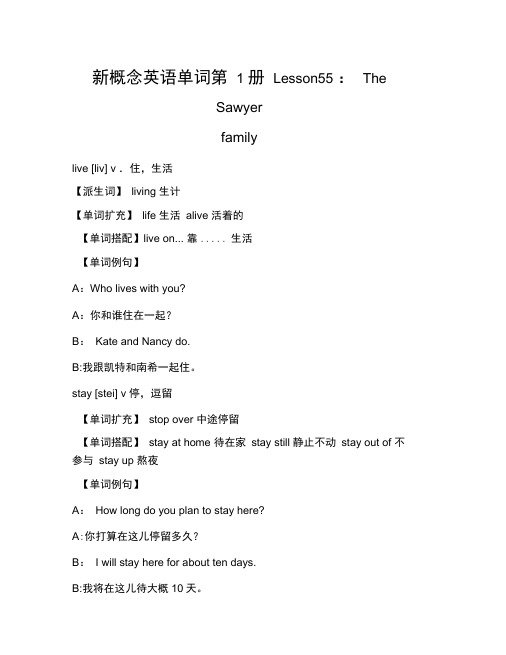新概念英语第一册Lesson 55&56精品课件!
- 格式:ppt
- 大小:5.03 MB
- 文档页数:36




Lesson 55New Words:live[li v]居住stay[stei] 停留housework['hauswə:k] 家务活usually ['ju:ʒuəli] 通常together[tə'ɡeðə] 一起arrive[ə'raiv] 到达lunch[lʌntʃ] 午餐afternoon['ɑ:ftə:'nu:n]下午evening['i:vniŋ] 晚上night[nait] 夜晚New Phrases:in the morning/afternoon/evening 在早晨/下午/晚上at noon/night在中午/夜晚go to work/school/bed 去工作/上学/睡觉take…to…把……带到……do the housework 做家务do one’s homework 做作业read one’s newspaper 看报纸New Sentences:What do/does + sb. usually/always/often do?Sb. +adv. +do/does sth. 一般现在时句子表达(详见Grammar)Warming up activities:Tell me something about your family.1、How many people are there in your family? Who are they?2、What does your mother do after supper?3、What does your father like to do on weekend?After this, please open your book and turn to Lesson 55, let us see who are the Sawyers, and what do they like to do?Read the paragraph by yourselves and then watch the vedio.Now, please answer my question.What does Mrs. Sawyer usually do in the afternoon?When do the children always do their homework?Grammar:一般现在时:表示经常的习惯性的动作或者是现在的状态,常与表示频度的时间状语连用,表示客观事实或普遍真理。


新概念英语单词第 1 册Lesson55 :TheSawyerfamilylive [liv] v .住,生活【派生词】living 生计【单词扩充】life 生活alive 活着的【单词搭配】live on... 靠..... 生活【单词例句】A:Who lives with you?A:你和谁住在一起?B:Kate and Nancy do.B:我跟凯特和南希一起住。
stay [stei] v 停,逗留【单词扩充】stop over 中途停留【单词搭配】stay at home 待在家stay still 静止不动stay out of 不参与stay up 熬夜【单词例句】A:How long do you plan to stay here?A:你打算在这儿停留多久?B:I will stay here for about ten days.B:我将在这儿待大概10天。
home [hum] n. 家;adv 在家,至U家【派生词】homeland 祖国【单词搭配】at home 在家go home 回家【单词例句】A:I must go back home where many things are waiting for me to settle.A:我必须回家了,很多事正等着我去处理。
B:We're very sorry to see you go.B:您要走了,我们感到非常遗憾。
housework['haswk] n. 家务【单词构造】house (房子)+work (工作)二housework (家务)【单词搭配】do the housework 做家务【单词例句】A: My mother always says I spend too much time on watching TV. A:我妈妈总是说我把太多的时间花费在看电视上。
B: Then you should finish your homework, and then help your parents with the housework some day.B:那你以后应该先完成家庭怍业,然后帮父母做些家务。
新概念英语第一册语法综述(LESSON55-LESSON60)Part 11、Which season do you like best? 注意这个句子的结构,一般来说,除了频率副词之外,副词修饰动词时,应放在实义动词之后,如果有宾语的话,那么放在宾语的后面,如:My sister likes pop music best. 我妹妹最喜欢流行音乐。
同样的课文中:The sun rises early and2、early late 都可以做形容词。
You are early today. 你来的很早。
Don’t be late for school. 上学不要晚了3、The Sawyers live at 87 King Street.这句话中,姓氏前加The并加复数,代表索耶一家人,尤其是代表索耶夫妇俩。
而如果是具体的门牌号,要用介词at,否则用in,另外说地址要从小到大描述不能说King Street No.87。
在英文中表示“姓......的一家人”的方法有以下两种:<1>在表示姓氏的名词前面加上定冠词,后面加上family。
比如:the Lee family 姓李的一家人。
<2>在姓氏名词的复数形式前加上定冠词。
比如:the Lees 姓李的一家人。
The Sawyers live in King Street.4、Their fathers take them to school every day. take sb to place. 带某人去某地。
Sunday I take my children to zoo and watch the panda. 星期天,我带着孩子到动物园看熊猫。
The children come home from school. 孩子们从学校回到家。
注意from这个词,意思是“从…”。
It takes 30 minutes from home to the school. 从家到学校需要30分钟。
新概念英语第一册第55-56课:The Sawyer familyLesson 55 The Sawyer family索耶一家人Listen to the tape then answer this question. When do the children do their homework?听录音,然后回答问题。
孩子们什么时候做功课?The Sawyers live at 87 King Street.索耶一家住在国王街87号。
In the morning, Mrs Sawyer goes to work and the children go to school.早上,索耶先生去上班,孩子们去上学。
Their father takes them to school every day.父亲每天送孩子们去上学。
Mrs Sawyer stays at home every day. She does the housework.索耶夫人每天呆在家里。
她料理家务。
She always eats her lunch at noon.她总是在正午吃午饭。
In the afternoon, she usually sees her friends. They often drink tea together.下午,她总是会见她的朋友。
她们经常在一起喝茶。
In the evening, the children come home from school. They arrive home early.傍晚,孩子们放学回家。
他们到家很早。
Mr Sawyer comes home from work. He arrives home late.索耶先生下班回家。
他到家很晚。
At night, the children always do their homework. Then they go to bed.晚上,孩子们总是做作业,然后去睡觉。